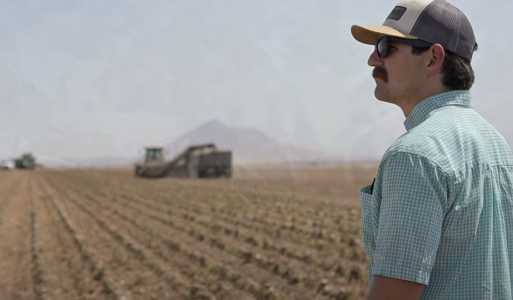Factory closure stirs concern in US town—what it means for jobs and farms
By
Veronica E.
- Replies 0
For nearly 80 years, sugar beets have been part of daily life in California’s Imperial Valley, supplying countless homes with the sweetness we often take for granted.
But this longstanding agricultural tradition is coming to a sudden halt.
The Spreckels Sugar Company, the state’s last remaining sugar beet processing plant, is shutting down for good.
The closure will leave hundreds of workers without jobs and force local farmers to rethink what they grow.
It’s a sobering moment that signals deeper economic challenges across the state.

The Spreckels Sugar Company has been turning sugar beets into table sugar in Brawley, California, for 78 years.
Located in the heart of the Imperial Valley, the plant played a central role in the region’s agricultural economy.
But operations are winding down, with a full closure expected by late 2024 or early 2025.
The Southern Minnesota Beet Sugar Cooperative, which owns the facility, said the shutdown was driven by a combination of falling sugar prices, inflation, and high costs of doing business in California.
"This was a difficult decision brought about by factors largely out of our control," said CEO Paul Fry.
Despite past investments in the plant, the cooperative has chosen to focus on a more financially stable facility in Renville, Minnesota.
The closure will directly impact 700 workers employed at the Brawley factory.
That’s a significant blow in Imperial County, a region that already struggles with high unemployment and limited job opportunities outside of agriculture.
The loss of the sugar beet sector—valued at around $243 million—is expected to ripple through the broader economy.
Farmers are also facing a tough reality.
Ben Abatti III, a local grower, summed it up by asking, “The million-dollar question is, what do we grow now?”
Sugar beets once thrived in the region’s fertile soil and sun-soaked climate, aided by irrigation from the Colorado River.
But now that federal regulations limit where sugar beets can be processed, farmers may have few viable alternatives.
The closure of the Spreckels plant isn’t just a local story—it reflects a wider trend.
Across the country, 28 sugar beet and sugar cane factories have closed since 2000, leaving only 43 still in operation.
And many other industries are reconsidering their future in California.
Republic National Distributing, the nation’s second-largest alcohol distributor, recently announced its exit from the state.
Citing high costs and changing industry dynamics, the company is redirecting its focus to more business-friendly states like Texas and Kentucky.
Their statement referenced "rising operational costs, industry headwinds, and supplier changes" as key reasons for leaving California behind.
Retailers are also taking note.
Marcus Lemonis, executive chairman of Bed Bath & Beyond, has said publicly that the company does not plan to open any new stores in California.
According to Lemonis, the regulatory environment and risk of lawsuits make the state a challenging place for businesses to grow.
"We want to be in markets where we can actually make a profit," he explained.
These moves raise difficult questions about how California’s policies are affecting long-term investment.
From agriculture to retail, companies are voting with their feet—and leaving.
California still has many strengths, but for some industries, the cost of staying has simply become too high.
Several major factors are at play:
These challenges are especially difficult for manufacturers and agricultural businesses that operate on tight margins.
In the short term, the future is uncertain for many in the Imperial Valley.
Workers will need to find new jobs, and some may need to leave the area altogether.
Farmers must decide what crops—if any—can replace sugar beets in both profitability and viability.
The community, long shaped by agriculture, may have to redefine its economic identity.
At the state level, California faces a larger question: How can it balance worker protections and environmental standards while remaining attractive to businesses?
Finding that balance will be critical if the state wants to preserve jobs and support struggling communities.
Read next: After 117 years, a beloved neighborhood pharmacy is closing its doors—what that means for the community

At The GrayVine, we believe in sharing stories that hit close to home. Have you experienced job loss or witnessed the effects of factory closures in your area? Do you have ideas for how California can keep its industries strong while supporting its workers?
We encourage you to share your thoughts, stories, or suggestions in the comments. These moments of transition are hard—but they’re also an opportunity to reflect, support one another, and imagine new possibilities.
But this longstanding agricultural tradition is coming to a sudden halt.
The Spreckels Sugar Company, the state’s last remaining sugar beet processing plant, is shutting down for good.
The closure will leave hundreds of workers without jobs and force local farmers to rethink what they grow.
It’s a sobering moment that signals deeper economic challenges across the state.

A major shift in California agriculture: the end of sugar beet production in the Imperial Valley. Image Source: YouTube / KPBS Public Media.
A bittersweet farewell to a local legacy
The Spreckels Sugar Company has been turning sugar beets into table sugar in Brawley, California, for 78 years.
Located in the heart of the Imperial Valley, the plant played a central role in the region’s agricultural economy.
But operations are winding down, with a full closure expected by late 2024 or early 2025.
The Southern Minnesota Beet Sugar Cooperative, which owns the facility, said the shutdown was driven by a combination of falling sugar prices, inflation, and high costs of doing business in California.
"This was a difficult decision brought about by factors largely out of our control," said CEO Paul Fry.
Despite past investments in the plant, the cooperative has chosen to focus on a more financially stable facility in Renville, Minnesota.
Also read: Another dining chain is saying goodbye to dozens of locations—will your go-to spot survive?
The human cost: 700 jobs on the line
The closure will directly impact 700 workers employed at the Brawley factory.
That’s a significant blow in Imperial County, a region that already struggles with high unemployment and limited job opportunities outside of agriculture.
The loss of the sugar beet sector—valued at around $243 million—is expected to ripple through the broader economy.
Farmers are also facing a tough reality.
Ben Abatti III, a local grower, summed it up by asking, “The million-dollar question is, what do we grow now?”
Sugar beets once thrived in the region’s fertile soil and sun-soaked climate, aided by irrigation from the Colorado River.
But now that federal regulations limit where sugar beets can be processed, farmers may have few viable alternatives.
Also read: The resurgence of American manufacturing: How tariffs are bringing jobs back home
More than sugar: a pattern of businesses leaving
The closure of the Spreckels plant isn’t just a local story—it reflects a wider trend.
Across the country, 28 sugar beet and sugar cane factories have closed since 2000, leaving only 43 still in operation.
And many other industries are reconsidering their future in California.
Republic National Distributing, the nation’s second-largest alcohol distributor, recently announced its exit from the state.
Citing high costs and changing industry dynamics, the company is redirecting its focus to more business-friendly states like Texas and Kentucky.
Their statement referenced "rising operational costs, industry headwinds, and supplier changes" as key reasons for leaving California behind.
Also read: This beloved peanut shop is closing—what its final farewell means for small towns everywhere
Companies are thinking twice about California
Retailers are also taking note.
Marcus Lemonis, executive chairman of Bed Bath & Beyond, has said publicly that the company does not plan to open any new stores in California.
According to Lemonis, the regulatory environment and risk of lawsuits make the state a challenging place for businesses to grow.
"We want to be in markets where we can actually make a profit," he explained.
These moves raise difficult questions about how California’s policies are affecting long-term investment.
From agriculture to retail, companies are voting with their feet—and leaving.
Also read: After 118 years in business, Home Depot’s oldest competition is closing its doors
What’s driving this exodus?
California still has many strengths, but for some industries, the cost of staying has simply become too high.
Several major factors are at play:
- High operational costs: Labor, energy, and transportation expenses are among the highest in the country.
- Tough regulations: Environmental and labor laws, while important, can be difficult to comply with and costly to implement.
- Pandemic aftershocks: Supply chain disruptions and inflation continue to impact profits.
- Unstable markets: Global competition and price volatility make it harder to plan for the future.
These challenges are especially difficult for manufacturers and agricultural businesses that operate on tight margins.
Also read: After 117 years, LA's oldest sandwich shop is closing—and here's why it matters
What happens next for the Imperial Valley?
In the short term, the future is uncertain for many in the Imperial Valley.
Workers will need to find new jobs, and some may need to leave the area altogether.
Farmers must decide what crops—if any—can replace sugar beets in both profitability and viability.
The community, long shaped by agriculture, may have to redefine its economic identity.
At the state level, California faces a larger question: How can it balance worker protections and environmental standards while remaining attractive to businesses?
Finding that balance will be critical if the state wants to preserve jobs and support struggling communities.
Read next: After 117 years, a beloved neighborhood pharmacy is closing its doors—what that means for the community
Key Takeaways
- California’s last sugar beet processing plant, Spreckels Sugar Company in Brawley, is closing by early 2025, ending nearly 80 years of local production.
- The decision will eliminate 700 jobs and impact a $243 million industry, adding stress to an area already facing high unemployment.
- The closure reflects larger trends, as high costs and strict regulations prompt companies in agriculture, retail, and distribution to leave California.
- The state must now grapple with how to retain industries and protect workers while navigating inflation, policy pressures, and a shifting economy.
At The GrayVine, we believe in sharing stories that hit close to home. Have you experienced job loss or witnessed the effects of factory closures in your area? Do you have ideas for how California can keep its industries strong while supporting its workers?
We encourage you to share your thoughts, stories, or suggestions in the comments. These moments of transition are hard—but they’re also an opportunity to reflect, support one another, and imagine new possibilities.






